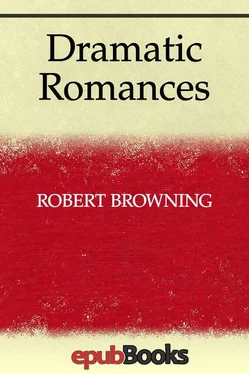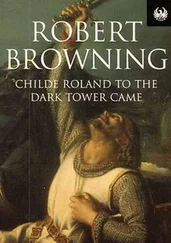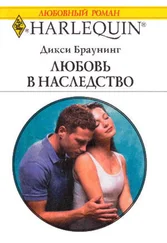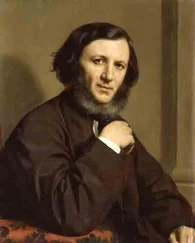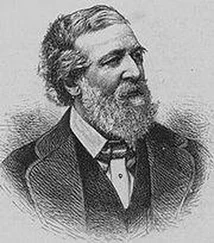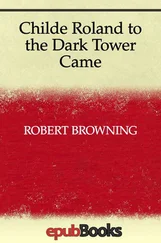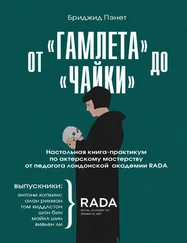IV
Then the beggar, "See your sins!
Of old, unless I err,
Ye had brothers for inmates, twins,
Date and Dabitur.
V
"While Date was in good case
Dabitur flourished too:
For Dabitur's lenten face
No wonder if Date rue. 20
VI
"Would ye retrieve the one?
Try and make plump the other!
When Date's penance is done,
Dabitur helps his brother.
VII
"Only, beware relapse!"
The Abbot hung his head.
This beggar might be perhaps
An angel, Luther said.
NOTES:
"The Twins" versifies a story told by Martin Luther in his "Table Talk," in which the saying, "Give and it shall be given unto you," is quaintly personified by the Latin words equivalent in meaning: Date, "Give," and Dabitur, "It–shall–be–given–unto–you."
I. Martin Luther: (1483–1546), the leader of the Reformation.
I
So far as our story approaches the end,
Which do you pity the most of us three?
My friend, or the mistress of my friend
With her wanton eyes, or me?
II
My friend was already too good to lose,
And seemed in the way of improvement yet,
When she crossed his path with her hunting noose
And over him drew her net.
III
When I saw him tangled in her toils,
A shame, said I, if she adds just him 10
To her nine–and–ninety other spoils,
The hundredth for a whim!
IV
And before my friend be wholly hers,
How easy to prove to him, I said,
An eagle's the game her pride prefers,
Though she snaps at a wren instead!
V
So, I gave her eyes my own eyes to take,
My hand sought hers as in earnest need,
And round she turned for my noble sake,
And gave me herself indeed. 20
VI
The eagle am I, with my fame in the world,
The wren is he, with his maiden face.
You look away and your lip is curled?
Patience, a moment's space!
VII
For see, my friend goes shaking and white;
He eyes me as the basilisk:
I have turned, it appears, his day to night,
Eclipsing his sun's disk.
VIII
And I did it, he thinks, as a very thief:
"Though I love her—that, he comprehends— 30
One should master one's passions (love, in chief)
And be loyal to one's friends!"
IX
And she,—she lies in my hand as tame
As a pear late basking over a wall;
Just a touch to try and off it came;
'Tis mine,—can I let it fall?
X
With no mind to eat it, that's the worst!
Were it thrown in the road, would the case assist?
'Twas quenching a dozen blue–flies' thirst
When I gave its stalk a twist. 40
XI
And I,—what I seem to my friend, you see:
What I soon shall seem to his love, you guess:
What I seem to myself, do you ask of me?
No hero, I confess.
XII
'Tis an awkward thing to play with souls,
And matter enough to save one's own:
Yet think of my friend, and the burning coals
He played with for bits of stone!
XIII
One likes to show the truth for the truth;
That the woman was light is very true: 50
But suppose she says,—Never mind that youth!
What wrong have I done to you?
XIV
Well, any how, here the story stays,
So far at least as I understand;
And, Robert Browning, you writer of plays,
Here's a subject made to your hand!
NOTES:
"A Light Woman" is the story of a dramatic situation brought about by the speaker's intermeddling to save his less sophisticated friend from a light woman's toils. He deflects her interest and wins her heart, and this is the ironical outcome: his friendly, dispassionate act makes him seem to his friend a disloyal passion's slave; his scorn of the light woman teaches him her genuineness, and proves himself lighter than she; his futile assumption of the god manoeuvring souls makes the whole story dramatically imply, in a way dear to Browning's heart, the sacredness and worth of each individuality.
I
I said—Then, dearest, since 'tis so,
Since now at length my fate I know,
Since nothing all my love avails,
Since all, my life seemed meant for, fails,
Since this was written and needs must be—
My whole heart rises up to bless
Your name in pride and thankfulness!
Take back the hope you gave—I claim
Only a memory of the same,
—And this beside, if you will not blame, 10
Your leave for one more last ride with me.
II
My mistress bent that brow of hers;
Those deep dark eyes where pride demurs
When pity would be softening through,
Fixed me a breathing–while or two
With life or death in the balance: right!
The blood replenished me again;
My last thought was at least not vain:
I and my mistress, side by side
Shall be together, breathe and ride, 20
So, one day more am I deified.
Who knows but the world may end tonight?
III
Hush! if you saw some western cloud
All billowy–bosomed, over–bowed
By many benedictions—sun's
And moon's and evening–star's at once—
And so, you, looking and loving best,
Conscious grew, your passion drew
Cloud, sunset, moonrise, star–shine too,
Down on you, near and yet more near, 30
Till flesh must fade for heaven was here!—
Thus leant she and lingered—joy and fear!
Thus lay she a moment on my breast.
IV
Then we began to ride. My soul
Smoothed itself out, a long–cramped scroll
Freshening and fluttering in the wind.
Past hopes already lay behind.
What need to strive with a life awry?
Had I said that, had I done this,
So might I gain, so might I miss. 40
Might she have loved me? just as well
She might have hated, who can tell!
Where had I been now if the worst befell?
And here we are riding, she and I.
V
Fail I alone, in words and deeds?
Why, all men strive and who succeeds?
We rode; it seemed my spirit flew,
Saw other regions, cities new
As the world rushed by on either side.
I thought,—All labour, yet no less 50
Bear up beneath their unsuccess
Look at the end of work, contrast
The petty done, the undone vast,
This present of theirs with the hopeful past!
I hoped she would love me; here we ride.
VI
What hand and brain went ever paired?
What heart alike conceived and dared?
What act proved all its thought had been?
What will but felt the fleshly screen? 60
We ride and I see her bosom heave.
There's many a crown for who can reach.
Ten lines, a statesman's life in each!
The flag stuck on a heap of bones,
A soldier's doing! what atones?
They scratch his name on the Abbey–stones.
My riding is better, by their leave.
VII
What does it all mean, poet? Well,
Your brains beat into rhythm, you tell
What we felt only; you expressed 70
You hold things beautiful the best,
And pace them in rhyme so, side by side.
'Tis something, nay 'tis much: but then,
Have you yourself what's best for men?
Are you—poor, sick, old ere your time—
Nearer one whit your own sublime
Than we who never have turned a rhyme?
Sing, riding's a joy! For me, I ride.
Читать дальше
